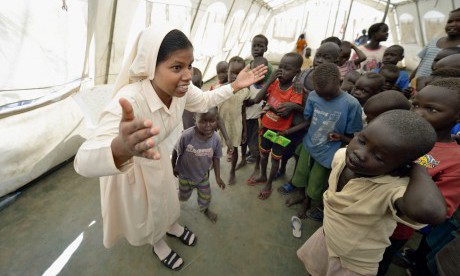It takes nerves of steel to stand in your doorway and tell rebel soldiers waving guns that no, the woman they are seeking is most certainly not in the room behind you, when in fact she is hiding a few feet away, under your bed. But that’s what Sister Rosemary Nyirumbe did.
It takes stunning courage to spend your life with the drug traffickers and other offenders serving time in Mexico’s most notorious prison, but that’s what the late Mother Antonia Brenner did, with a commitment to this work of mercy that her fellow sisters still carry on today.
It takes an ocean of faith in God to bid a bittersweet farewell to your cherished work in Catholic education and move 800 miles away to live and work with the poor. But that’s what Sister Johnna Ciezobka and Sister Susanne Dziedzic did.
It takes bold creativity to decide you will be the one to reach out to farmworker families in California who speak only one language, Mixteco, of which you can speak about three words. But that’s what Sister Sandra Silva did.
In the years since the Second Vatican Council, after many women religious turned their Catholic schools and hospitals over to the capable hands of laypeople, they frequently found their new callings among the poor in places often referred to inelegantly as “the middle of nowhere.” These women anticipated by decades the call of Pope Francis: “We must get out of ourselves and go toward the periphery.”
If you happen upon a forgotten corner of desperate poverty or a neglected collection of humanity, chances are good that a religious woman has arrived before you. You’ll find her running a soup kitchen or a food pantry, teaching someone to read, praying with farmworkers in the fields, or caring for men and women on the streets, in prison, or in the hospital. Continue reading
- Source: U.S. Catholic
- Image: The Dialogue
News category: Features.




